This past week, former Nigerian President Olusegun Obasanjo brought together some of the biggest names in the country’s political firmament to discuss the travails of Western liberal democracy in Africa. For the conferees, the main reason Western liberal democracy is “not working” for the continent is because of its origination in an alien Western environment. This, the reasoning goes, makes it inherently incompatible with the continent’s purportedly unique cultural characteristics.
The Nigerian statesman’s reservations about the suitability of liberal democracy for African societies are not unfamiliar, though the recent ascendance to the Nigerian presidency of a political foe he did everything in his power to obstruct may have given it added impetus. Yet, he is not the only major African politician or intellectual to have expressed such doubts. Following the failure of many elected governments across the continent to curb corruption, arrest political decay, and expand economic opportunity, the clamor for a “homegrown alternative” that will presumably accomplish what Western liberal democracy has failed to do has intensified.
More on:
Sub-Saharan Africa
Democracy
Civil Society
Politics and Government
Nigeria
The frustration underlying this clamor is useful as a barometer of the progress of self-rule across the continent, and worth acknowledging insofar as it provides fuel for social mobilization aimed at inducing political accountability. It helps to remember that disgruntlement at their perceived social invisibility was the main reason throngs of young people enthusiastically welcomed the recent overthrow of elected governments in various Sahelian and Western African countries.
That being said, while vexation at a lack of democratic progress is essential for deepening democracy and hence ought to be welcome as such, the notion that democracy in Africa is failing because the cultural soil is by definition inhospitable to Western liberal democracy is quite the opposite. One is part and parcel of the everyday inquest that allows democracies to engage in self-examination and correct course, the other is false, dangerous and, truth be told, reactionary.
The purported incompatibility of Western liberal democracy with African cultural conditions rests on certain unproven assumptions about African culture; one, that there is a cogent, stable, and essentially timeless “African culture” to speak of; second, that its basic alterity is such that one may rightly expect what works elsewhere not to work for Africans. Third, it is assumed that, being “indigenous,” this culture is thereby superior to Western liberal democracy with its “alien” precepts.
Not only does the claim that indigenous modes of governance across Africa were democratic lack historical evidence, the hypothesis of a unitary African culture is almost certainly a phantom. As Cornell University political philosopher Olufemi Taiwo persuasively argues, different and often contradictory notions of Africa and African-ness have prevailed in various parts of Africa at different historical moments. The contemporary one is no different. Besides, the notion of a culture so singular in its essence as to be irreconcilable with anything ‘”foreign,” apart from being demonstrably false, revives the racist trope of an Africa destined to exist beyond the compass of human history, and hence one to which rules applicable to other societies and cultures may not apply.
Nor is that all. By reducing liberal representative democracy to a property of the “West,” champions of Afro-democracy simultaneously gloss over the success of liberal representative democracy in various societies and cultural contexts outside the geographic West, and overlook the hard-won progress recorded across Africa. Emerging out of the political ruins of prolonged military rule and endemic authoritarianism, a growing number of African countries have overcome sluggish starts and defied the worst prophecies of doom to institute systems where orderly transition of power is the accepted norm. No doubt, the elections are frequently rancorous and violence-prone, and the continued presence on the scene of “rulers for life” who have hoarded power for decades is a reminder of the scale and complexity of the challenge before the continent.
More on:
Sub-Saharan Africa
Democracy
Civil Society
Politics and Government
Nigeria
Nonetheless, beneath the apparent turmoil, anyone who cares to look can see that real change is happening, as indexed by the increased diversification and robustness of the media; a civil society that, as evidenced by the successful standoff with President Macky Sall in Senegal, refuses to be cowered; the entrance of a new generation of politicians into the political process on the back of regular, if flawed, elections; and the growing assertiveness of young people who insist on holding African leaders to the standard and mores of other countries.
None of this is to deny the basic legitimacy of the displeasure with democracy in practice that appears to be driving the quest for Afro-democracy. What is being disputed is the idea, one, that liberal representative democracy does not and cannot work in Africa because it is somehow incompatible with African culture; and two, that the travails of liberal democracy in Africa are somehow due to this insoluble antagonism. On the contrary, not only does liberal representative democracy work everywhere—one fails to see why it should not—if Africa’s democratic experience reveals any overarching truth, it is that problems have typically ensued when political actors have trifled with or totally abdicated its norms. This is as true for newly consolidating (African) democracies, as it is for the advanced ones.
In an intellectual atmosphere otherwise rife with hostility to the West and Western liberal democracy, perhaps a modicum of ethnocentrism might be excused. Be that as it may, Africa’s political difficulties call for hard thinking, not a regression into historical fantasy and pseudo-identitarianism.

